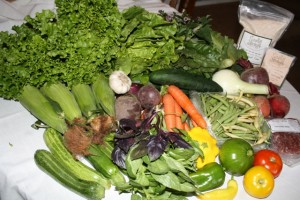3 Sep 2010
Whither Local?
The locasphere (i.e., the local-food blogosphere) has been abuzz recently thanks to an op-ed in the New York Times a couple of weeks ago entitled “Math Lessons For Locavores,” penned by historian and journalist Stephen Budiansky, who writes the entertaining and thought-provoking Liberal Curmudgeon blog. In it, he critiqued the idea of using food miles as the critical measure of sustainability in food.
It’s not a new critique, and neither is his characterization of local-food advocates as humorless scolds who are fundamentalists about food miles while misunderstanding the big picture of agricultural energy use. Certainly some locavores meet that definition, but most advocates of local food—at least those I’ve met—are not nearly as blindered and strident as the caricatures in Budiansky’s piece. In response, the environmental website Grist.org gathered a virtual roundtable of people who’ve written extensively about local food (including James McWilliams, one of the first to critique the reliance on food miles), and their essays are collected on the site under the tongue-in-cheek headline, “Food Fight.”
Budiansky’s main point—that sometimes food shipped from beyond the local “foodshed” can be considered sustainable—is one that I basically agree with. Humans have traveled and traded for foodstuffs throughout history. The concept of food miles is easy to grasp at an intuitive level (although the frequently quoted average food-mile figures are a bitch to confirm) but only measures a portion of the energy used to grow food and get it from the farm to my fork, as he rightly points out.
Most people who have thoughtfully considered the sustainability of their own food habits already know this. And there are more reasons to buy local food beyond a simple calculation of food miles.
I have been part of a community-supported agriculture program for ten years now; every Saturday, from June through September, either I or my friend Jean visit the Tolstoy Farm booth at the Spokane Farmers Market and pick up a box filled with produce. We pay for our share of the farm’s produce in the spring, when the farm needs the cash, and then we reap the benefit for about 17 weeks. If it’s cool early in the season, like this year was, then we have to wait awhile before we see warm-weather crops like cucumbers and peppers, but we end up with a great crop of lettuce and greens. We take a chance on the farm’s success, just like the farmers do.
I can’t speak for Jean, but I choose to do this mainly because the produce is delicious; it was grown using organic methods and picked just hours before I pick it up. I have a relationship with the people who grew my food. And the price is really pretty reasonable, considering the high quality.
But the other reason is because I want to live in a community where there are viable small farms nearby. I want to live in a city that supports the vibrant mini-community that the farmers market has become, and I have to support the farms and the markets if I want them to remain. I love that I can walk to the market, pile the week’s produce into my backpack and a couple of bags, greet and visit with vendors and other shoppers, and then walk back home again, feeling virtuous.
Now, Budiansky might suggest that my sense of virtue is misplaced. For as long as I store that food in my refrigerator or freezer, I’m consuming energy; and when I cook it, I’m using energy there, too. But considering the choices that are readily available to me at the moment—balancing my budgets of time, money and personal energy, and my inability to build a campfire—I feel like I’m making the best choice I can in favor of sustainability, justice and the good of the larger community. When I buy a locally grown product, I know who’s involved at each step along the way. My food system is a web of personal relationships.
During the other 35 weeks of the year, when I get no CSA box, my choices can be more challenging. I will occasionally splurge on fresh produce (generally organic) from warmer climes during the winter, but even as I do, I know it’s a luxury, and I recognize it as such. Living in the north as I do, I know that I should not consider fresh tomatoes or strawberries in January to be my birthright. Most of the time, I choose seasonally appropriate items—or I eat local veggies that I’ve stashed away in my freezer.
But at least I have choices, which is more than many people have. And that leads to the social justice dimension of food choices. As my wise friend Linda puts it, I have to ask what the hidden costs are—to the environment and to other people—when my food is cheap. Whose drinking water gets polluted by runoff from the many chemical inputs to large-scale monoculture farming? Who has to survive on a minimum-wage food-processing job? Who is harmed when grocery stores move out of the city’s downtown core? Who gets sick from salmonella-tainted eggs?
In other words, who is paying the price to keep my food costs at a historic low?
When I buy my produce (and meat and eggs and wheat flour) from local growers at the Spokane Farmers Market (or one of the other markets in the area), that purchase helps the growers stay in business. It also helps to support the market itself—and the market, in turn, then has the resources to accept public food assistance vouchers (from WIC and programs for needy seniors), thus making healthy local food available to people who might not otherwise have access to fresh produce. And I know that my money is not being used to enrich people like egg baron Jack DeCoster, whose corporate practices were making headlines in Maine back in the late 1990s when I lived there.
Although I frequently buy local food, I do not consider myself a locavore. Instead, I like to think of my food choices as mindful and considered, rather than espousing any particular doctrine. I know that my choices (even for my single-person household) have an impact, and I try to “vote with my fork” within the limits of my resources. How I balance those choices and resources on a daily basis is what this blog is all about.



Ann,
Just found your blog via Barb Chamberlain. Look forward to more insightful posts. I’m going to add you to my blogroll.
craig
September 5th, 2010 at 9:02 ampermalink
Great meeting you last night, Ann. And great to have found another food blogger with a conscience! Let’s keep in touch.
Ellen
September 10th, 2010 at 8:40 ampermalink